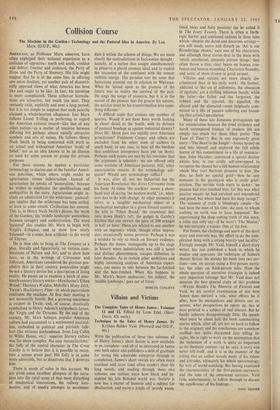Villains and Victims
WITH the publication of these two volumes all of Henry James's short fiction is now available to us, complete—and all of us interested in James owe both editor and publishers a debt of gratitude for seeing this admirable enterprise through to completion. James's short stories are often more mordant and terse (and often cruder) than his long novels, and reading through these two volumes one realises anew how bleak and be- nighted his late fictional world was. Society is now less a matter of humour and a subject for idealisation, and more a jungle of 'greedy wants, timid ideas and fishy passions' (as he called it in The Ivory Tower). There is often a forth- right horror and confessed sadness in these tales which—despite the dated and decorous settings— can still reach, move and disturb us. `Art is our flounderings shown,' says one of his characters, and although these stories deal in the main with `small, smothered, intensely private things,' they often throw a thin, clear beam on human con- fusion and human wounding. Characters flounder, and some of them drown in good earnest.
Villains and victims are more clearly dis- criminated than in his early work: the former, addicted to 'the sin of selfishness, the obsession of egotism,' are a chilling inhuman bunch; while the latter—the failed and the forgotten, the robbed and the rejected, the appalled, the abused and the alienated-i-seem helplessly com- mitted to a life of passive suffering and brood- ing (but artistic) speculation.
Many of these late Jamesian protagonists opt for renunciation because the cruel stridency and harsh untempered friction of modern life are simply too much for them (they prefer 'The Tone of Time'!). But in one supremely great story—`The Beast in the Jungle'—James turned on and into himself and explored the full subtle horror of this commitment to a life of renuncia- tion. John Marcher, convinced a special destiny awaits him, is too aridly self-enwrapped to recognise the chance for a full human relationship which May (sic) Bartram presents to him. She dies, he feels no special grief—then he sees someone in the graveyard who is really grief- stricken. The terrible truth starts to dawn: `no passion had ever touched him, for this was what passion meant; he had survived and maundered and pined, but where had been his deep ravage?' The moment of truth is blindingly simple—'he had been the man of his time, the man, to whom nothing on earth was to have happened.' Re- experiencing the deep cutting truth of this story, a critic can only say—if he wasn't 'The Master,' he was certainly a master. One of the few.
For James, the challenge and merit of the short
story and nouvelle was 'the effort to do the com- plicated thing with a strong brevity and lucidity.' Fittingly enough, Mr. Vaid, himself a short-story writer, has just published a book in which he studies and appraises the technique of James's shorter fiction. He divides his book into two sec- tions—one, on stories using a first-person narra- tor, the other on third-person tales. Now the whole question of narrative strategies is indeed very important (strange that Mr. Vaid does not mention the best general study of this problem —Wayne Booth's The Rhetoric of Fiction) and Vaid, by his careful examination of just how. James does unravel a tale, what effects he is after, how he manipulates and directs our re- sponse, what perspectives he opens up, has at least pointed to a subject of real interest. But he finally achieves disappointingly little. He spends what must be about half the book summarising stories which, after all, are not so hard to follow in the original: and his conclusions are somehow muffled—not quite sharpened into telling in- sights. He is right to work on the assumption that the technique of a work is quite as important as its thematic content—as he says, a story can never tell itself, and it is in the manner of the
telling that an author reveals many of his values and attitudes, ultimately his whole epistemology, his way of world-watching. But having examined the characteristics of the first-person narrators, and the tone of the omniscent narrator, Vaid fails, unfortunately, to follow through to discuss the significance of his findings.
TONY TANNER






































 Previous page
Previous page